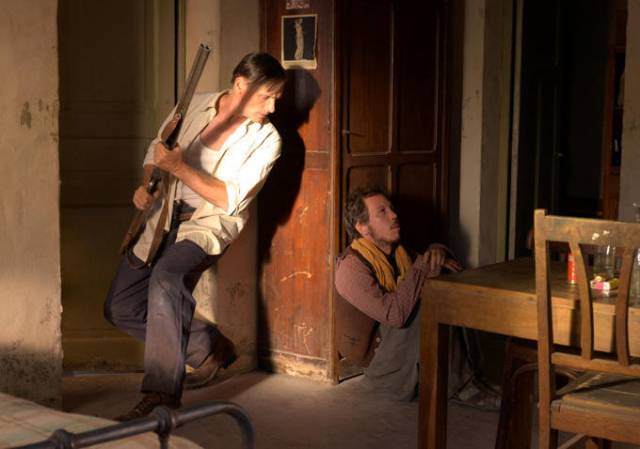
 In Far From Men, director David Oelhoffen weaves several varied threads into an utterly unique and compelling film. On the surface, it’s a rugged adventure story in which a man must transport a prisoner across hostile terrain, a plot that recalls many Western classics like 3:10 to Yuma. Visually and thematically, Far From Men is working in the tradition of the American Western, specifically the more humanist, revisionist Westerns of the '50s and '60s, whose creators were skeptical of the classic Western narrative of “civilizing” wild lands and peoples. But Oelhoffen takes these themes and transplants them both geographically and politically miles away to the deserts of Algeria in 1954, on the cusp of the nationalist rebellion that would oust the French colonists. Yet even in this turbulent setting, Oelhoffen doesn’t forget the concerns of Albert Camus, whose short story “The Guest” is the basis of the film, and whose philosophical questions loom over the action of the story.
In Far From Men, director David Oelhoffen weaves several varied threads into an utterly unique and compelling film. On the surface, it’s a rugged adventure story in which a man must transport a prisoner across hostile terrain, a plot that recalls many Western classics like 3:10 to Yuma. Visually and thematically, Far From Men is working in the tradition of the American Western, specifically the more humanist, revisionist Westerns of the '50s and '60s, whose creators were skeptical of the classic Western narrative of “civilizing” wild lands and peoples. But Oelhoffen takes these themes and transplants them both geographically and politically miles away to the deserts of Algeria in 1954, on the cusp of the nationalist rebellion that would oust the French colonists. Yet even in this turbulent setting, Oelhoffen doesn’t forget the concerns of Albert Camus, whose short story “The Guest” is the basis of the film, and whose philosophical questions loom over the action of the story.
Daru (Viggo Mortensen) is a veteran living on an isolated plateau, teaching the local children in a small schoolhouse. A French authority comes to him with a prisoner, Mohammed (Reda Kateb), and insists that Daru, as a reserve army officer, transport the prisoner to a town a few days away since the usual authorities are busy fighting the uprising. Mohammed is common criminal, rather than a political one; he killed a cousin who had been stealing food from Mohammed’s wife and children. Mohammed has confessed fully and with no malice, simply explaining that his family would have starved otherwise. Daru is reluctant to take a man to his certain death and uncomprehending of why a man would submit so passively to his death, even when given chances to escape. As the two men set out, they grow to know one another, and Daru learns that Mohammed’s choice is not so simple; he has started a deadly feud, wherein his cousins must seek vengeance, just as his sons would have to seek vengeance if Mohammed were to be killed by the cousins. The only way to avoid a cycle of killing is to allow the French to take his life. Along their journey, they encounter both sides of the conflict, first Algerian freedom fighters, some of whom know and respect Daru from earlier military service, and then French soldiers, who massacre surrendering Algerians under the logic that they are not recognized as enemy combatants, a semantic defense still used by governments today. In the revolutionary climate, Daru also faces a choice with no good answer; we learn that he is not actually French, but a “Caracole,” the son of Spanish immigrants who was born here and considers it his homeland, but is viewed as an outsider by the French and native Algerians alike.
Daru and Mohammed journey through an Algeria portrayed with the sweeping grandeur of John Ford’s Monument Valley. Mortensen’s Jauja also featured exotic landscapes, but shot in the unusual 4:3 aspect ratio, which worked for that unusual film, but Far From Men uses the widescreen format to stunning effect, as transporting as any of the classic Westerns it emulates. There are many incidents both minor and life threatening on the road, but Oelhoffen uses them not to ratchet up the tension, but to pose moral challenges to both Daru and Mohammed, allowing their characters to grow more nuanced in the eyes of both the audience and each other. Mortensen’s singular presence is perfectly suited for this role from his ambiguous national background to his virile yet reflective demeanor, which allows him convincingly play a former soldier who has tried to renounce violence, a man of quiet passion. Kateb is also excellent as a foil to Mortensen, starting out as an object of contempt whose grows in Daru’s estimation as his own subtle morality is revealed.
Far From Men uses expansive settings to show the growth of an intimate connection between the two men, and their growing realization that their choices are not as stark as the landscapes they travel. Oelhoffen subverts the usual politics of the Western by using its tropes in the midst of an anti-colonial war and by making his protagonist part of an even smaller outsider group, who has served both colony and colonizer yet finds neither will fully claim him. But ultimately, Far From Men is a film about individual choice, the freedom to choose one’s own fate, but, as this is a western without the comforting ease of white hats and black hats, Oelhoffen presents a moral landscape where choices are not so simple.